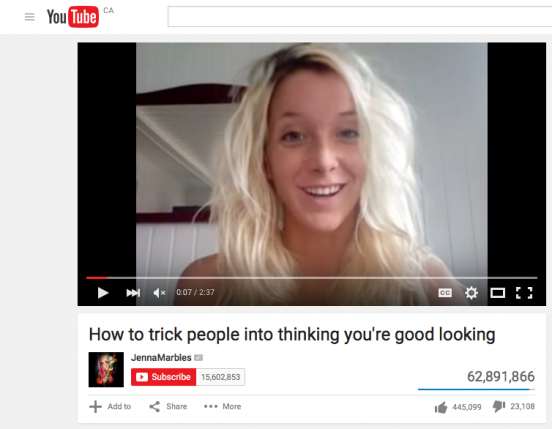With the corresponding rise of social media and autobiographical representation there follows rise of the combination- autobiographical representation in social media. In particular, vlogs (video blogs) have become a prominent form. These videos serve as more than merely the telling of a life story; they can be used to provide counter-stories to common stereotypes. The YouTube videos of Jenna Mourey, also known as Jenna Marbles, is a strong example of the counter-story in action. The video that sparked her popularity, “How to Trick People Into Thinking You’re Good Looking” (Mourey), uses her “ascribed status” (Ritzer and Guppy 2014) as an attractive young woman in her self-representation to mock itself. The video begins with Mourey barefaced and progresses as she applies “cartoon eyebrows” and “hoochie lipstick” (Mourey). In also speaking about her master’s degree and job as a go-go dancer she shows a “range of self-representations” (Maguire 84) that extend past her ascribed status. Mourey uses sarcastic language in her tutorial to ridicule this status that society attributes her to. Emma Maguire describes this as critiquing the “social order that objectifies, commoditizes, and sexualizes girls” (82) while simultaneously using her image for promotion of her brand. This is comparable to Cockeyed: A Memoir, by Ryan Knighton, who uses his persona of a blind man to provide a counter-story of disability that focuses on him as a person rather than a victim with an inability to live normally. Both Mourey and Knighton wield the popularity of their default positions within society to give alternate narratives. These autobiographical practices of counter-narratives are especially significant with the contemporary youth focus on social media. The pressure of society for individuals to conform to specific roles can be lessened with greater public understanding of the people who are actually reduced to those roles and how they extend past that position. With the increasing availability of counter-stories the counter-story could become the story instead.
Works Cited
Knighton, Ryan. Cockeyed: A Memoir. Toronto: Penguin Canada, 2006. Print.
Maguire, Emma. “Self-Branding, Hotness, and Girlhood in the Video Blogs of Jenna Marbles.” Biography 38.1 (2015): 72-86. Web. 6 Nov. 2015.
Mourey, Jenna. “How to Trick People Into Thinking You’re Good Looking.” Online video clip. YouTube. YouTube, 9 July. 2010. Web. 6 Nov. 2015.
Ritzer, George, and Guppy, Neil. Introduction to Sociology: Canadian Version. Thousand Oaks: Sage Publications, 2014. Print.



